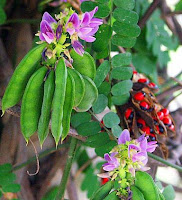Gunja (Abrus precatorius, English: Rosary Pea) - A Magical and Tantric plant in Indian Folklore.
Gunja (Abrus precatorius, English: Rosary Pea) - A Magical and
Tantric plant in Indian Folklore.
The forests in the mountains behind our house in Khadkhadi, Haridwar
were a fascinating mystery to our curious minds. Despite being forbidden we
made frequent forays to gather herbs. The main attraction was the Gunja Vine. The
feathery leaves were sweet and good for the throat. Carefully collected and
gifted the leaves to grandfather to add in his Paan and grandma for adding to
tea merited both a pat on the head and a scolding “Told you not to go to the
forest. The tiger has no sympathy for your plants“. Our mother would add them
to our nightly ‘Banafshah Kadha’ to add to the potency of liquorice (Mulethi-
one of the ingredients of this traditional brew also
But the attraction of collecting
the seed pods overcame the fear of the tiger. In summer, they would burst open
and flame up the forest with miniature orange suns. The vines were a riot of
color due to the bright orange and black seeds like a small round capsule. They
call it ‘Ratti’, we collected for our local jeweler to measure his gold with an
anticipation of a pair of silver earrings and ring in return. The berries are
highly poisonous. But again due to natural instinct we only ate the leaves,
much to the relief of our elders, when they asked us if we had swallowed any
seed.
Uses:
The extract of the root of the plant is used for application to relieve
eye diseases.
The roots and leaves are good for managing minor cough and cold.
Good for Bronchitis, mouth ulcers, acidity, mild digestive and
expectorant.
Seeds (for EXTERNAL USE only):
a) The
paste of seeds is applied locally in alopecia and skin diseases.
b) The
seeds can be woven into a necklace and worn both for ornamental purpose and
believed in ancient folklore to keep away evil spirits.


Comments
Post a Comment